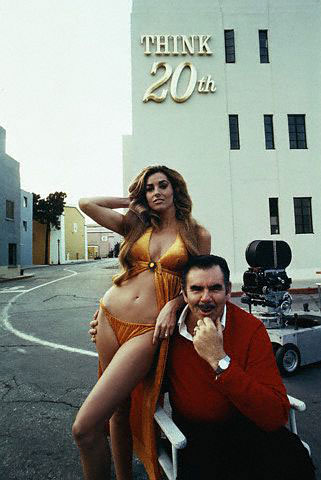
So like did Russ Meyer get into a fist fight with Johnny Rotten in 1977 or what?
 I think Russ Meyer is a paradigm. For what? Well, I'm not exactly sure how to phrase it, but I think it's how I want to live my life, at least inside the Hotboxed Jetta.
I think Russ Meyer is a paradigm. For what? Well, I'm not exactly sure how to phrase it, but I think it's how I want to live my life, at least inside the Hotboxed Jetta.Just what is it about Russ Meyer that's so captivating? For one thing, his hedonism has a psychological depth and avant-saviness that really distinguishes it from the rest of the dredge. Some have called him the Fellini of the sex-industry. I don't think that's too far off. Let's examine some facts and statements. "I love big-breasted women with wasp waists. I love them with big cleavages," says Meyer. "I always had a tremendous interest in big tits." And, "I'd rather play cards if I can't have a lady with big tits." In an interview with the NY Times, Meyer claimed that while he was working as an army photographer in France during WWII Ernest Hemingway took him on his first visit to a whorehouse. During the same war, Meyer photographed the regiment of British soldiers sent on a suicide mission which became the premise of The Dirty Dozen (yeah Lee Marvin), and some of his wartime footage can be seen in Patton. In the 70s, Meyer was supposed to direct a film scripted by Rogert Ebert and starring the Sex Pistols, called Who Killed Bambi?, but production ended on the first day when he couldn't pay the electric bill.
Okay, so what the hell am I getting at? Sure, it's well and good to say that Meyer is the oversexed version of Fellini, being as all his films are dreams visions. Wet dream visions. But there's something more. Meyer is also the oversexed version of Forrest Gump, with a sick oeuvre to back up his case. He rode the wave of history, thru war, love, and counterculture, and metamorphosed all the time. His fingerprint is on the Paris avant-garde, the documentation of WWII, 60s sexual lib, and more.

What's more? Meyer's celluloid wet dreams are at the vanguard of postmodern kitsch. In Faster, Pussycat! Kill! Kill!, his narrative and visual reference points embrace roadshow sexploitation, psychodrama, crime drama, noir, and Steinbeck. But his appropriation isn't homage in the sense of the neo-noir contemporary to his work. Nor is it completely ironic in the sense of parody. What could he parody? The settings of the film aren't of the past, where he could dish on the outdatedness of say Dwain Esper or Fritz Lang. No, they're entirely contemporary. Faster, Pussycat! isn't about opium dens or midnight diners, it's rooted in go-go crazy-bop mid-60s So-Cal.
I mean, Jon Waters is ironic kitsch parody. His films appropriate a style owing to a time and place, but they condescend to that world and palette. For something more verite, we have to go back earlier than Jon Waters. And that's Russ Meyer, who appropriates, or rather accepts what is already appropriated, and believes that this is the scope of the real world around him.
So Meyer is essentially addressing how people who act socially prescribed roles (go-go dancers cum gangster molls, or anyone in the Modern Era) self-consciously but automatically invest their lives in cultural tropes received through the contemporary sociohistorical milieu. It's reflexivity without the act of ironic comment. Basically Meyer is depicting the Postmodern Era, wherein everyone subscribes to their social role but realizes that it's just a role but is incapable of imagining a cast of characters or cultural vocabulary other than this. It's really post-Sartre. It's not irony, because there's no distance between the comment and what's being commented on, the point of reference is the frame of reference. So what is it? That's the genius of Russ Meyer.
~Chez

1 comment:
Hello. This post is likeable, and your blog is very interesting, congratulations :-). I will add in my blogroll =). If possible gives a last there on my blog, it is about the Perfume, I hope you enjoy. The address is http://perfumes-brasil.blogspot.com. A hug.
Post a Comment